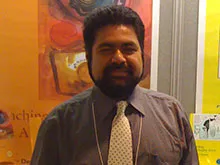
During the 2009-2010 academic year, I was fortunate to spend time at the National Humanities Center in North Carolina under the auspices of the Frederick Burkhardt Fellowship Program of the American Council of Learned Societies. While this was my first fellowship from the ACLS, I was no stranger to the National Humanities Center. Indeed, the Center was one of the highlights of my graduate school experience at neighboring Duke University since it was a venue that brought together thirty to forty faculty fellows in the humanities from institutions around the world for a year's worth of scholarly research and writing. Engaging with a number of these visiting fellows in those years of dissertation research invariably marked my own work in very productive ways. Then, in 2001-2002, I was lucky to garner one such fellowship from the NHC myself and I spent a productive year there starting research on a book project that is now seeing completion.
The book I have been working on is a literary and cultural study of the Indian presence in the Eastern and Southern parts of Africa. The connections between the Indian sub-continent and Africa have been long-standing, and while my book primarily focuses on the late nineteenth and twentieth century migrations and their literary manifestations, I also frame that later discussion in the context of the 12th century Indian Ocean trade between Egypt and India documented in the Cairo Geniza and brought to light in a marvelous travelogue by the Indian anthropologist turned creative writer, Amitav Ghosh (In an Antique Land, New York, Knopf, 1993). While engaging with a number of lesser known writers from the region, I also devote considerable attention to the works of M.G. Vassanji, a writer of East African Asian origin who has been much celebrated in the Western hemisphere, receiving a number of literary awards including the prestigious Giller Prize in Canada which he has won for two different works. (The Book of Secrets, New York, Picador, 1994; The In-Between World of Vikram Lall, New York, Knopf, 2004). My recently published article "Oceans Connect: The Indian Ocean and African Identities" provides a preview of some of the claims that I make in the book. (PMLA, 125 (3) (May 2010), 713- 720).
While the greater majority of my time was spent on the book project, there were a few other commitments and projects that I was also involved in. As an elected member of the Modern Language Association's Delegate Assembly Organizing Committee, I joined my colleagues in New York in October 2009 to plan for the Delegate Assembly meeting at the annual convention in Philadelphia. One of our projects was to put together a panel that focused on Academic Labor Issues in Hard Times, a topic that has become even more urgent across the nation today. Later this month, as Chair of the DAOC, I will join my colleagues once again at the MLA Headquarters in New York to discuss trends in higher education and the particular challenges facing the Humanities.
Perhaps the greatest personal highlight of 2009-2010 was the publication of my edited collection Teaching the African Novel published in the Options For Teaching series of the Modern Language Association of America. The book was launched at the annual convention of the MLA in Philadelphia with two panel discussions devoted to it. I was touched by the interest the book generated not only during the panel sessions but also in terms of pre-publication sales. While in the grand scheme of things, as an edited collection rather than a monograph this was a 'side project,' this book will always mean a lot to me since the bulk of the editorial work on the volume was done during the 'Katrina semester' when like most in the city, we were away from home. The book and the contributors during that semester were a real source of comfort.
In retrospect, then, 2009-2010 was an active and busy year. In addition to presenting talks at Duke and N.C. State, I accepted invitations to serve as Keynote Speaker at a conference on Migrations at the University of Colorado, Boulder and an international conference on English Studies in Amravati, India. I was also invited to serve as Conference Convener for an International Conference on the "Virtual Transformation of the Public Sphere" that will take place in Chandigarh, India this coming December. Based on the abstracts that we have received, I am looking forward to a very productive conference.

